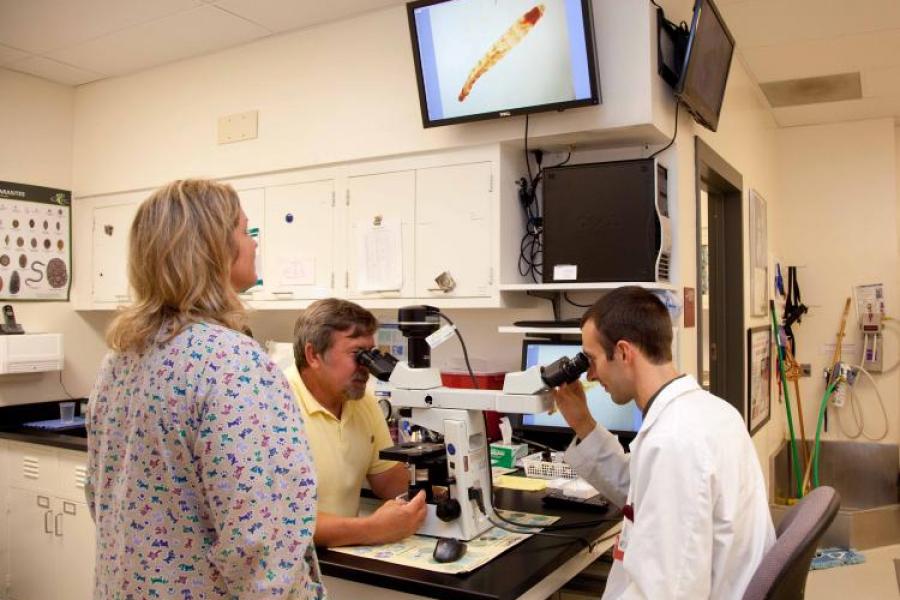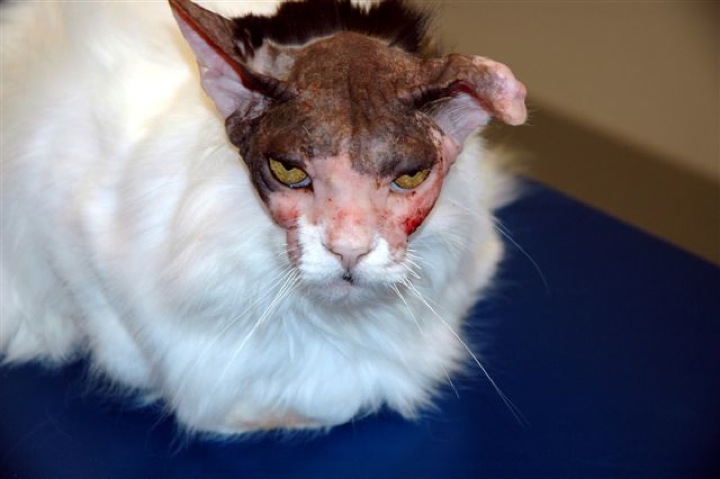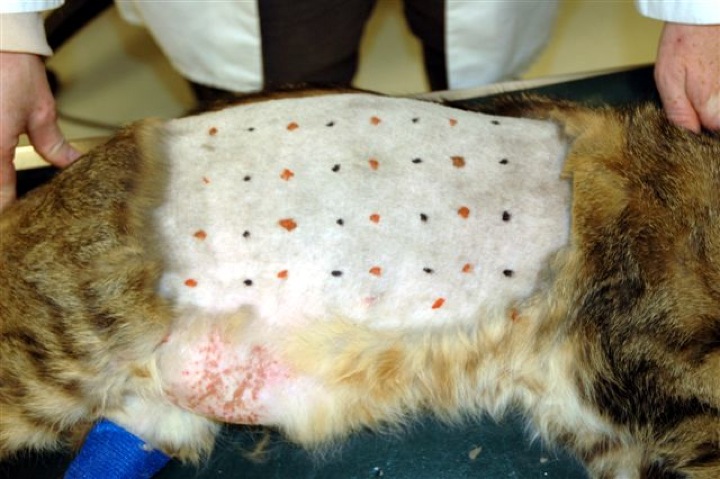Dermatology

The Dermatology Service at the Cornell University Hospital for Animals provides the best-available specialty care for companion animals with skin and ear conditions. We work closely with other services including Ophthalmology, Surgery, Oncology, Neurology, Imaging and Internal Medicine to provide comprehensive care for your animal.
We offer state-of-the-art diagnostic techniques and treatments, including digital video ear examinations, intradermal and serologic allergy testing, cryotherapy and have CO2 laser capability. We also read skin biopsies submitted to our diagnostic laboratory through the university clinics and from private practitioners.
Advanced Techniques
- Intradermal allergy testing
- Serologic allergy testing
- Cryotherapy
- CO2 laser
What to Expect During Your Appointment
 Your scheduled visit to the Dermatology Service at the Cornell University Hospital for Animals begins with check in at the reception desk. Following a small amount of paperwork, you will be greeted in the waiting room by one or two students currently in their dermatology rotation and brought to a private examination room.
Your scheduled visit to the Dermatology Service at the Cornell University Hospital for Animals begins with check in at the reception desk. Following a small amount of paperwork, you will be greeted in the waiting room by one or two students currently in their dermatology rotation and brought to a private examination room.
The students will inquire about your pet's history and perform a physical examination of your pet - an invaluable experience for their education and development. We appreciate your patience and understanding in allowing these future veterinarians to interact with you and your pet.
The students will then leave to consult with an intern, resident or faculty member about the history, physical examination and recommendations for case management. The faculty member, resident, or intern will accompany the student back to your examination room to examine your pet again. They may recommend further testing, and will discuss with you potential diagnosis, next steps, cost and logistics.
Often, you will be asked to leave your pet in the care of our students so that we can begin appropriate testing, which can include blood tests or allergy testing. Given our busy schedule and consultations with other specialists regarding your pet's care, you may be asked to return to discuss our findings later in the day.
The Dermatology service also frequently sees Cornell patients admitted under the care of other specialties.
Many skin diseases are chronic in nature and require a lifelong treatment plan. Our service will plan follow-up phone consultations with you or your referring veterinarian to ensure any chronic conditions are management well over time.
For Your Pet's Dermatology Appointment
Please follow these instructions exactly, or we may not be able to do all that is required on the day of the appointment.
- Do not bathe your pet for 7 days before the scheduled appointment.
- Give NO food or snack of any kind to your pet the day of the examination. Your pet may have as much water as he/ she wants.
- Bring the completed history form, along with as much additional information about your pet's condition as possible. A referral letter from your veterinarian or a copy of your pet's medical record is very helpful. Also, New York State Law requires a valid rabies certificate to be presented upon arrival to our hospital. Failure to do so may result in your pet not being evaluated.
-
Write down and bring with you the names of all medications (pills, capsules, shots, shampoos, ointments, drops) your pet uses now or has used within the last 30 days. For oral medications (pills or liquids taken by mouth), please write down:
- the size (number of milligrams) of the pill/capsule,
- the number of pills or amount of liquid being given at each dosage, and
- how many times each day the medicine was/is given.
Skin testing usually is not done during the first appointment, especially if the appointment is in the afternoon. Occasionally, an exception can be made and the testing will be performed on the day of the initial examination provided that time and space allow and if all the following requirements for allergy testing are met:
- The skin on either the right or left side of the chest must be fairly normal. If you have any question about whether there is enough normal skin for testing, please have your local veterinarian examine your pet within one week of the Cornell appointment.
- If your pet has previously been seen by Cornell's Dermatology Service, bathing with a grooming or antiseptic shampoo is allowed up until the date of testing.
- If your pet has not been seen by Cornell's Dermatology Service, do not bathe your pet 7 days before the scheduled appointment.
- Oral antibiotics or anti-yeast medications may be given until the night before the testing.
- Certain medicines must be taken away from your pet in order to obtain an accurate allergy test. Withdraw the following drugs according to the schedule below. If you have questions, please check with your veterinarian and/or with us:
| Steroids: (Prednisone, Cortisone) |
[ ] No oral medications for 3 weeks prior to the test [ ] No topical steroids for 3 weeks, such as ear medications, eye medications, sprays, shampoos, etc. [ ] No steroid injections for 6 weeks |
| Nonsteroidals: | [ ] No Zubrin® , antihistamines, tricyclic antidepressants, pentoxifylline for 2 weeks |
| Cyclosporin: | [ ] No Atopica®, Neoral® or generics for 4 weeks |
| Fatty acids: | [ ] No fatty acid supplements for 14 days |
Dermatology: Medical Conditions
 Allergic skin conditions
Allergic skin conditions
Allergies are common in dogs and cats. The flea and other insects are the most common allergens, but allergies to environmental materials including pollens, dust mites and mold spores, or foods are also common. The ease and success of treatment depends on the inciting cause. Flea or food allergy is relatively easy to deal with while “pollen” allergies are more problematic and often require allergy testing.
Staph infection
Staphylococcus bacteria is the most common cause of skin infection that we see. The bacteria can be transmitted easily from animal to animal and rarely from animal to human, and is found on all breeds of animals.
The most typical symptoms are a tender or itchy rash. The infection is diagnosed using skin tests and microbiology and treated with topical and/or oral antibiotics. Some strains are antibiotic resistant and require stronger medicines for treatment.
Ear Disease
Ear infections with bacteria or yeast are common in dogs, but also occur in cats. The infections are caused by a trigger - for example excessive moisture due to swimming, ear mites or allergies - that needs to be resolved along with the infection. Some organisms like Pseudomonas or methicillin-resistant staphylococcus are particularly difficult to deal with and can take months of continual treatment.
Fungal infections
Fungal infections from external sources are not as common in central New York as they are in other parts of the United States. The most common fungal disease seen by the dermatology group is an overgrowth of Malassezia yeast, which are part of the normal flora of an animal’s skin. In these cases, the yeast have to be treated aggressively but the underlying trigger event - for example, allergies, greasy skin disorders or excessive swimming - also needs to be resolved. The most common external source of fungal disease is ringworm, but we occasionally see animals with more severe internal fungal disease that have spread to the skin.
Immune-mediated Disorders
Immune-mediated disorders are fairly common in companion animals. In some diseases, the animal’s immune system is fighting off a foreign substance, such as a fungal organism, and the skin gets attacked accidentally. Drugs are the most common triggers for this type of reaction. In other cases, the animal’s skin isn’t recognized as belonging to the animal and the immune system tries to reject the skin. These are the autoimmune diseases and require lifelong treatment.
Related Info
The American College of Veterinary Dermatology
The official specialty organization created to advance and promote excellence in veterinary dermatology, oversee postgraduate training in veterinary dermatology, sponsor research, and organize scientific and educational programs for both veterinary dermatologists and general practitioners.



 Allergic skin conditions
Allergic skin conditions